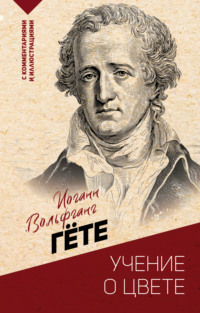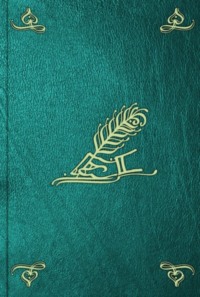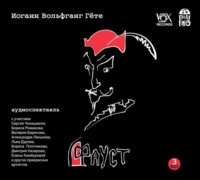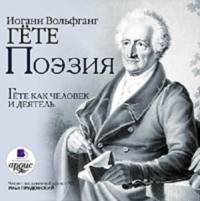 полная версия
полная версияThe Autobiography of Goethe
Things of this sort naturally made an impression on the Boy, and led him into similar states of mind. In fact, he came to the thought that he might immediately approach the great God of Nature, the Creator and Preserver of Heaven and Earth, whose earlier manifestations of wrath had been long forgotten in the beauty of the world, and the manifold blessings in which we participate while upon it. The way he took to accomplish this was very curious.
The Boy had chiefly kept to the first article of Belief. The God who stands in immediate connexion with nature, and owns and loves it as his work, seemed to him the proper God, who might be brought into closer relationship with man, as with everything else, and who would take care of him, as of the motion of the stars, the days and seasons, the animals and plants. There were texts of the Gospels which explicitly stated this. The Boy could ascribe no form to this Being; he therefore sought Him in His works, and would, in the good Old Testament fashion, build Him an altar. Natural productions were set forth as images of the world, over which a flame was to bum, signifying the aspirations of man's heart towards his Maker. He brought out of the collection of natural objects which he possessed, and which had been increased as chance directed, the best ores and other specimens.
The Boy-Priest.
But the next difficulty was, as to how they should be arranged and raised into a pile. His father possessed a beautiful red-lackered music-stand, ornamented with gilt flowers, in the form of a four-sided pyramid, with different elevations, which had been found convenient for quartets, but lately was not much in use. The Boy laid hands on this, and built up his representatives of Nature one above the other in steps, so that it all looked quite pretty and at the same time sufficiently significant. On an early sunrise his first worship of God was to be celebrated, but the young priest had not yet settled how to produce a flame which should at the same time emit an agreeable odour. At last it occurred to him to combine the two, as he possessed a few fumigating pastils, which diffused a pleasant fragrance with a glimmer, if not with a flame. Nay, this soft burning and exhalation seemed a better representation of what passes in the heart, than an open flame. The sun had already risen for a long time, but the neigbouring houses concealed the East. At last it glittered above the roofs, a burning-glass was at once taken up and applied to the pastils, which were fixed on the summit in a fine porcelain saucer. Everything succeeded according to the wish, and the devotion was perfect. The altar remained as a peculiar ornament of the room which had been assigned him in the new house. Every one regarded it only as a well-arranged collection of natural curiosities. The Boy knew better, but concealed his knowledge. He longed for a repetition of the solemnity. But unfortunately, just as the most opportune sun arose, the porcelain cup was not at hand; he placed the pastils immediately on the upper surface of the stand; they were kindled, and so great was the devotion of the priest, that he did not observe, until it was too late, the mischief his sacrifice was doing. The pastils had burned mercilessly into the red lacker and beautiful gold flowers, and as if some evil spirit had disappeared, had left their black, ineffaceable footprints. By this the young priest was thrown into the most extreme perplexity. The mischief could be covered up, it was true, with the larger pieces of his show-materials, but the spirit for new offerings was gone, and the accident might almost be considered a hint and warning of the danger there always is in wishing to approach the Deity in such a way.
SECOND BOOK
The New Paris – Frankfort CitizenAll that has been hitherto recorded indicates that happy and easy condition in which nations exist during a long peace. But nowhere probably is such a beautiful time enjoyed in greater comfort than in cities living under their own laws, and large enough to include a considerable number of citizens, and so situated as to enrich them by trade and commerce. Strangers find it to their advantage to come and go, and are under a necessity of bringing profit in order to acquire profit. Even if such cities rule but a small territory, they are the better qualified to advance their internal prosperity, as their external relations expose them to no costly undertakings or alliances.
Thus, the Frankforters passed a series of prosperous years during my childhood; but scarcely, on the 28th of August, 1756, had I completed my seventh year, than that world-renowned war broke out, which was also to exert great influence upon the next seven years of my life. Frederick the Second, King of Prussia, had fallen upon Saxony, with sixty thousand men; and instead of announcing his invasion by a declaration of war, he followed it up with a manifesto, composed by himself, as it was said, which explained the causes that had moved and justified him in so monstrous a step. The world, which saw itself appealed to not merely as spectator but as judge, immediately split into two parties, and our family was an image of the great whole.
My grandfather, who, as Schöff of Frankfort, had carried the coronation canopy over Francis the First, and had received from the Empress a heavy gold chain with her likeness, took the Austrian side along with some of his sons-in-law and daughters. My father having been nominated to the imperial council by Charles the Seventh, and sympathising sincerely in the fate of that unhappy monarch, leaned towards Prussia, with the other and smaller half of the family. Our meetings, which had been held on Sundays for many years uninterruptedly, were very soon disturbed. The misunderstandings so common among relatives by marriage, now first found a form in which they could be expressed. Contention, discord, silence, and separation ensued. My grandfather, otherwise a serene, quiet, and easy man, became impatient. The women vainly endeavoured to smother the flames; and after some unpleasant scenes, my father was the first to quit the society. At home now we rejoiced undisturbed in the Prussian victories, which were commonly announced with great glee by our vivacious aunt. Every other interest was forced to give way to this, and we passed the rest of the year in perpetual agitation. The occupation of Dresden, the moderation of the king at the outset, his slow but secure advances, the victory at Lowositz, the capture of the Saxons, were so many triumphs for our party. Everything that could be alleged for the advantage of our opponents was denied or depreciated; and as the members of the family on the other side did the same, they could not meet in the streets without disputes arising, as in Romeo and Juliet.
Family Disputes.
Thus I also was then a Prussian in my views, or, to speak more correctly, a Fritzian; since what cared we for Prussia? It was the personal character of the great king that worked upon all hearts. I rejoiced with my father in our conquests, readily copied the songs of triumph, and almost more willingly the lampoons directed against the other party, poor as the rhymes might be.
As the eldest grandson and godchild, I had dined every Sunday since my infancy with my grandfather and grandmother, and the hours so spent had been the most delightful of the whole week. But now I relished no morsel that I tasted, because I was compelled to hear the most horrible slanders of my hero. Here blew another wind, here sounded another tone than at home. My liking and even my respect for my grandfather and grandmother fell off. I could mention nothing of this to my parents, but avoided the matter, both on account of my own feelings, and because I had been warned by my mother. In this way I was thrown back upon myself; and as in my sixth year, after the earthquake at Lisbon, the goodness of God had become to me in some measure suspicious, so I began now, on account of Frederick the Second, to doubt the justice of the public. My heart was naturally inclined to reverence, and it required a great shock to stagger my faith in anything that was venerable. But alas! they had commended good manners and a becoming deportment to us, not for their own sake, but for the sake of the people. What will people say? was always the cry, and I thought that the people must be right good people, and would know how to judge of anything and everything. But my experience went just to the contrary. The greatest and most signal services were defamed and attacked; the noblest deeds, if not denied, were at least misrepresented and diminished; and this base injustice was done to the only man who was manifestly elevated above all his contemporaries, and who daily proved what he was able to do, – and that, not by the populace, but by distinguished men, as I took my grandfather and uncles to be. That parties existed, and that he himself belonged to a party, had never entered into the conceptions of the Boy. He, therefore, believed himself all the more right, and dared hold his own opinion for the better one, since he and those of like mind appreciated the beauty and other good qualities of Maria Theresa, and even did not grudge the Emperor Francis his love of jewelry and money. That Count Daun was often called an old dozer, they thought justifiable.
But now I consider the matter more closely, I trace here the germ of that disregard and even disdain of the public, which clung to me for a whole period of my life, and only in later days was brought within bounds by insight and cultivation. Suffice it to say, that the perception of the injustice of parties had even then a very unpleasant, nay, an injurious effect upon the Boy, as it accustomed him to separate himself from beloved and highly-valued persons. The quick succession of battles and events left the parties neither quiet nor rest. We ever found a malicious delight in reviving and re-sharpening those imaginary evils and capricious disputes; and thus we continued to tease each other, until the occupation of Frankfort by the French some years afterwards, brought real inconvenience into our homes.
In-door Amusements.
Although to most of us the important events occurring in distant parts served only for topics of ardent controversy, there were others who perceived the seriousness of the times, and feared that the sympathy of France might open a scene of war in our own vicinity. They kept us children at home more than before, and strove in many ways to occupy and amuse us. With this view, the puppet-show bequeathed by our grandmother was again brought forth, and arranged in such a way that the spectators sat in my gable room, while the persons managing and performing, as well as the theatre itself as far as the proscenium, found a place in the room adjoining. We were allowed, as a special favour, to invite first one and then another of the neighbours' children as spectators, and thus at the outset I gained many friends; but the restlessness inherent in children, did not suffer them to remain long a patient audience. They interrupted the play, and we were compelled to seek a younger public, which could at any rate be kept in order by the nurses and maids. The original drama to which the puppets had been specially adapted, we had learnt by heart, and in the beginning this was exclusively performed. Soon growing weary of it, however, we changed the dresses and decorations, and attempted various other pieces, which were indeed on too grand a scale for so narrow a stage. Although this presumption spoiled and finally quite destroyed what we performed, such childish pleasures and employments nevertheless exercised and advanced in many ways my power of invention and representation, my fancy and a certain technical skill, to a degree which in any other way could not perhaps have been secured in so short a time, in so confined a space, and at so little expense.
I had early learned to use compasses and ruler, because all the instructions they gave me in geometry were forthwith put into practice, and I occupied myself greatly with pasteboard-work. I did not stop at geometrical figures, little boxes, and such things, but invented pretty pleasure-houses adorned with pilasters, steps, and flat roofs. However, but little of this was completed.
Far more persevering was I, on the other hand, in arranging, with the help of our domestic (a tailor by trade), an armoury for the service of our plays and tragedies, which we ourselves performed with delight when we had outgrown the puppets. My playfellows, too, prepared for themselves such armouries, which they regarded as quite as fine and good as mine; but I had made provision not for the wants of one person only, and could furnish several of the little band with every requisite, and thus made myself more and more indispensable to our little circle. That such games tended to factions, quarrels, and blows, and commonly came to a sad end in tumult and vexation, may easily be supposed. In such cases certain of my companions generally took part with me, while others sided against me; though many changes of party occurred. One single boy, whom I will-call Pylades, urged by the others, once only left my party, but could scarcely for a moment maintain his hostile position. We were reconciled amid many tears, and for a long time afterwards kept faithfully together.
To him, as well as other well-wishers, I could render myself very agreeable by telling tales, which they most delighted to near when I was the hero of my own story. It greatly rejoiced them to know that such wonderful things could befall one of their own playfellows; nor was it any harm that they did not understand how I could find time and space for such adventures, as they must have been pretty well aware of all my comings and goings, and how I was occupied the entire day. Not the less necessary was it for me to select the localities of these occurrences, if not in another world, at least in another spot; and yet all was told as having taken place only to-day or yesterday. They rather, therefore, deceived themselves, than were imposed upon by me. If I had not gradually learned, in accordance with the instincts of my nature, to work up these visions and conceits into artistic forms, such vain-glorious beginnings could not have gone on without producing evil consequences for myself in the end.
Considering this impulse more closely, we may see in it that presumption with which the poet authoritatively utters the greatest improbabilities, and requires every one to recognise as real whatever may in any way seem to him, the inventor, as true.
But what is here told only in general terms, and by way of reflection, will perhaps become more apparent and interesting by means of an example. I subjoin, therefore, one of these tales, which, as I often had to repeat it to my comrades, still hovers entire in my imagination and memory.
THE NEW PARIS
A BOY'S LEGENDOn the night before Whit Sunday, not long since, I dreamed that I stood before a mirror, engaged with the new summer clothes which my dear parents had given me for the holiday. The dress consisted, as you know, of shoes of polished leather, with large silver buckles, fine cotton stockings, black nether garments of serge, and a coat of green baracan with gold buttons. The waistcoat of gold cloth was cut out of my father's bridal waistcoat. My hair had been frizzled and powdered, and my curls stuck out from my head like little wings; but I could not finish dressing myself, because I kept confusing the different articles, the first always falling off as soon as I was about to put on the next. In this dilemma, a young and handsome man came to me, and greeted me in the friendliest manner. "O! you are welcome!" said I, "I am very glad to see you here." "Do you know me, then?" replied he, smiling. "Why not?" was my no less smiling answer; "you are Mercury – I have often enough seen you represented in pictures." "I am, indeed," replied he; "and am sent to you by the gods on an important errand. Do you see these three apples?" – he stretched forth his hand, and showed me three apples, which it could hardly hold, and which were as wonderfully beautiful as they were large, the one of a red, the other of a yellow, the third of a green colour. One could not help thinking they were precious stones made into the form of fruit. I would have snatched them, but he drew back, and said, "You must know, in the first place, that they are not for you. You must give them to the three handsomest youths of the city, who then, each according to his lot, will find wives to the utmost of their wishes. Take them, and success to you!" said he, as he departed, leaving the apples in my open hands. They appeared to me to have become still larger. I held them up at once against the light and found them quite transparent; but soon they expanded upwards, and became three beautiful little ladies, about as large as middle-sized dolls, whose clothes were of the colours of the apples. They glided gently up my fingers, and when I was about to catch at them, to make sure of one at least, they had already soared high and far, and I had to put up with the disappointment. I stood there alt amazed and petrified, holding up my hands and staring at my fingers, as if there were still something on them to see. Suddenly I beheld, upon the very tips, a most lovely girl dancing, smaller than those, but pretty and lively, and as she did not fly away like the others, but remained dancing, now on one finger-point now on another, I regarded her for a long while with admiration. And, as she pleased me so much, I thought in the end I could catch her, and made as I fancied a very adroit grasp. But at the moment I felt such a blow on my head, that I fell down stunned, and did not awake from my stupor till it was time to dress myself and go to church.
During the service I often recalled those images to mind; and also when I was eating dinner at my grand-father's table. In the afternoon, I wished to visit some friends, partly to show myself in my now dress, with my hat under my arm and my sword by my side, and partly to return their visits. I found no one at home, and, as I heard that they were gone to the gardens, I resolved to follow them, and pass the evening pleasantly. My way led towards the entrenchments, and I came to the spot which is rightly called the Bad Wall; for it is never quite safe from ghosts there. I walked slowly, and thought of my three goddesses, but especially of the little nymph; and often held up my fingers, in hopes she might be kind enough to balance herself there again. With such thoughts I was proceeding, when I saw in the wall on my left hand a little gate, which I did not remember to have ever noticed before. It looked low, but its pointed arch would have allowed the tallest man to enter. Arch and wall were chiselled out in the handsomest way, both by mason and sculptor; but it was the door itself which first properly attracted my attention. The old brown wood, though slightly ornamented, was crossed with broad bands of brass, wrought both in relief and intaglio. The foliage on these, with the most natural birds sitting in it, I could not sufficiently admire. But, what seemed most remarkable, no keyhole could be seen, no latch, no knocker; and from this I conjectured that the door could be opened only from within. I was not in error; for when I went nearer, in order to touch the ornaments, it opened inwards, and there appeared a man whose dress was somewhat long, wide, and singular. A venerable beard enveloped his chin, so that I was inclined to think him a Jew. But he, as if he had divined my thoughts, made the sign of the Holy Cross, by which he gave me to understand that he was a good Catholic Christian. "Young gentleman, how came you here, and what are you doing?" – he said to me, with a friendly voice and manner. "I am admiring," I replied, "the workmanship of this door; for I have never seen anything like it, except in some small pieces in the collections of amateurs." "I am glad," he answered, "that you like such works. The door is much more beautiful inside. Come in, if you like." My heart, in some degree, failed me. The mysterious dress of the porter, the seclusion, and a something, I know not what, that seemed to be in the air, oppressed me. I paused, therefore, under the pretext of examining the outside still longer; and at the same time I cast stolen glances into the garden, for a garden it was which had opened before me. Just inside the door I saw a space. Old linden trees, standing at regular distances from each other, entirely covered it with their thickly interwoven branches, so that the most numerous parties, during the hottest of the day, might have refreshed themselves in the shade. Already I had stepped upon the threshold, and the old man contrived gradually to allure me on. Properly speaking, I did not resist; for I had always heard that a prince or sultan in such a case must never ask whether there be danger at hand. I had my sword by my side, too; and could I not soon have finished with the old man, in case of hostile demonstrations? I therefore entered perfectly reassured; the keeper closed the door, which bolted so softly that I scarcely heard it. He now showed me the workmanship on the inside, which in truth was still more artistic than the outside, explained it to me, and at the same time manifested particular good-will. Being thus entirely at my ease, I let myself be guided in the shaded space by the wall, that formed a circle, where I found much to admire. Niches tastefully adorned with shells, corals, and pieces of ore, poured a profusion of water from the mouths of Tritons into marble basins. Between them were aviaries and other lattice-work, in which squirrels frisked about, guinea-pigs ran hither and thither, with as many other pretty little creatures as one could wish to see. The birds called and sang to us as we advanced; the starlings particularly chattered the silliest stuff. One always cried, Paris! Paris! and the other Narcissus! Narcissus! as plainly as a schoolboy can say them. The old man seemed to continue looking at me earnestly while the birds called out thus, but I feigned not to notice it, and had in truth no time to attend to him; for I could easily perceive that we went round and round, and that this shaded space was in fact a great circle, which inclosed another much more important. Indeed we had actually reached the small door again, and it seemed as though the old man would let me out. But my eyes remained directed towards a golden railing, which seemed to hedge round the middle of this wonderful garden, and which I had found means enough of observing in our walk, although the old man managed to keep me always close to the wall, and therefore pretty far from the centre. And now, just as he was going to the door, I said to him, with a bow, "You have been so extremely kind to me, that I would fain venture to make one more request before I part from you. Might I not look more closely at that golden railing, which appears to inclose in a very wide circle the interior of the garden?" "Very willingly," replied he: "but in that case you must submit to some conditions." "In what do they consist?" I asked hastily. "You must leave here your hat and sword, and must not let go my hand while I accompany you." "Most willingly," I replied; and laid my hat and sword on the nearest stone bench. Immediately he grasped my left hand with his right, held it fast, and led me with some force straight forwards. When we reached the railing, my wonder changed into amazement. On a high socle of marble stood innumerable spears and partisans, ranged beneath each other, joined by their strangely ornamented points, and forming a complete circle. I looked through the intervals, and saw just behind a gently flowing piece of water, bounded on both sides by marble, and displaying in its clear depths a multitude of gold and silver fish, which moved about now slowly and now swiftly, now alone and now in shoals. I would also fain have looked beyond the canal, to see what there was in the heart of the garden. But I found, to my great sorrow, that the other side of the water was bordered by a similar railing, and with so much art, that to each interval on this side exactly fitted a spear or partisan on the other. These and the other ornaments rendered it impossible for one to see through, stand as one would. Besides, the old man, who still held me fast, prevented me from moving freely. My curiosity, meanwhile, after all that I had seen, increased more and more; and I took heart to ask the old man whether one could not pass over. "Why not?" returned he, "but on new conditions." When I asked him what these were, he gave me to understand that I must put on other clothes. I was satisfied to do so; he led me back towards the wall, into a small neat room, on the sides of which hung many kinds of garments, all of which seemed to approach the oriental costume. I soon changed my dress. He confined my powdered hair under a many coloured net, after having to my horror violently dusted it out. Now standing before a great mirror, I found myself quite handsome in my disguise, and pleased myself better than in my formal Sunday clothes. I made gestures and leaped as I had seen the dancers do at the Fair-theatre. In the midst of this I looked in the glass, and saw by chance the image of a niche which was behind me. On its white ground hung three green cords, each of them twisted up in a way which from the distance I could not clearly discern. I therefore turned round rather hastily, and asked the old man about the niche as well as the cords. He very courteously took a cord down, and showed it to me. It was a band of green silk of moderate thickness; the ends of which joined by green leather with two holes in it, gave it the appearance of an instrument for no very desirable purpose. The thing struck me as suspicious, and I asked the old man the meaning. He answered me very quietly and kindly, "This is for those who abuse the confidence which is here readily shown them." He hung the cord again in its place, and immediately desired me to follow him; for this time he did not hold me, and so I walked freely beside him.









